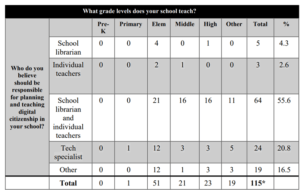Digital citizenship can be defined as the best version of yourself using technology and being valuable to society. Any society expects its citizens to behave in a certain way according to accepted norms, rules, and laws. All good citizens must abide by certain rules like protecting private information and respecting themselves and others, staying safe online, standing up to cyberbullying when they see it happening, balancing the time when they are using online or any social media, respecting copyright, and intellectual property, and carefully managing their digital footprint.
To understand digital citizenship, we can imagine the following:
 A man walking on snow (left), and another woman walking on the seashore (right). For the first man, his footprint is printed on snow, but for the other one, every impression is washed off by a wave at the seashore. Using this illustration, we leave our footprint behind on the web when we use the Internet on any platform making it easily available to a hacker or anonymous person who can easily utilize your personal information for any reason.
A man walking on snow (left), and another woman walking on the seashore (right). For the first man, his footprint is printed on snow, but for the other one, every impression is washed off by a wave at the seashore. Using this illustration, we leave our footprint behind on the web when we use the Internet on any platform making it easily available to a hacker or anonymous person who can easily utilize your personal information for any reason.
All citizens must be aware of digital citizenship in this fast-growing digital age. We must ensure that right from early school life, students are aware of digital citizenship so they can be responsible digital citizens in t he future. Worldwide international schools have already started teaching and providing hands-on training for digital citizenship. In this matter, librarians are at the forefront of teaching digital citizenship. Children often learn their first lessons about the topic from their local librarian or school librarian.
he future. Worldwide international schools have already started teaching and providing hands-on training for digital citizenship. In this matter, librarians are at the forefront of teaching digital citizenship. Children often learn their first lessons about the topic from their local librarian or school librarian.
Librarians play a critical role in this information age. In 2015, the Utah State Legislature passed H.B. 213, “Safe Technology Utilization and Digital Citizenship in Public Schools.” Whereas initial conversations with school librarians at multiple school districts in Utah (U.S.A.) suggested that the implicit expectation among district leaders was for school librarians to deliver digital citizenship instruction, in part because many of the school librarians were responsible for information literacy instruction and because the web had increasingly become a default information source for research (Phillips and Lee).
Table:1. Responsibility for planning digital citizenship by position within the school (Phillips and Lee).
Position Frequency Percent
School Librarian – 40% 20%
Individual Teachers – 31 % 15.5%
Combination of Librarians & Teachers 53% 26.5%
Technology Specialist – 51% 25.5%
Other responses – 25% 12.5%
Total 200% 100%
Table:2. Belief regarding responsibility for planning and teaching digital citizenship by grade level taught (Phillips and Lee).
This survey, “Who is responsible for planning digital citizenship instruction at your school? Please select all that apply,” was conducted by Phillips and Lee. We can observe, according to participants, that school librarians and technology specialists shoulder a significant amount of responsibility. In Table 1, it is evident that responsibilities overlap. Table 2 compares beliefs by grade level based on respondents’ perceptions of responsibility. Despite the fact that school librarians are not the only ones delivering digital citizenship instruction to their students, the responses in tables 1 and 2 indicate that they do so effectively.
As we can see from the survey result, a librarian’s role is an integral part of a school as a digital citizenship educator. In the present digital age, every international school worldwide is enrolling digital citizenship in its curriculum. International schools in India are also a step ahead in working toward digital citizenship learning in schools. For example:
- Raising children in a tech age: Oberoi International School conducts workshop on ‘Digital Citizenship.
- Digital Citizenship and Cyber Safety by GEMS International School, Palam Vihar
As the inclusion of digital citizenship learning in the curriculum continues to grow, there is an opportunity for every school librarian to become an expert in this field and be a pioneer and take on a leadership role. As digital environments evolve, including social media and various platforms, it is important to keep in mind the changing nature of the digital world. A librarian should plan his lesson plan to include digital etiquette, internet safety, and cyberbullying with some handouts, worksheets, video lessons, and instant examples of some harassment case studies of cyberbullying or unsafe internet use to spread awareness among students. Students need to be taught about effective passwords, e-mail spoofing, phishing, social media, literacy intelligence, and plagiarism. To filter and monitor web content, an I.T. specialist must be involved. Several online resources are available to assist educators in developing and creating their digital citizenship curriculum. Some examples are as follows:
- “Be Internet Awesome” by Google
- Microsoft Digital Literacy Curriculum
- Safe Online Surfing from the F.B.I.
- Ignition, a Digital Literacy & Responsibility curriculum by Everfi
In the past, teachers love to experience learning, discovering, and collaborating within the classrooms. But times have changed; now, students have the digital world at their fingertips. They can take their class beyond classroom walls. Students can research topics online, make presentations online, and even chat with friends over social media. So, students from early years need to learn how to be a good digital citizen. And the teacher-librarian can collaborate with teachers and the administration in any school.
Digital citizenship has nine elements. (a) digital access (b) digital commerce (c) digital communication (d) digital literacy (e) digital etiquette (f) digital law (g) digital rights and responsibilities (h) digital health and wellness (i) digital security.
A librarian as an information literacy expert in partnership with classroom teachers can improve how digital citizenship can be incorporated into the curriculum for k-12 students. In this leadership role, a librarian can develop fundamental skills of digital citizenship where they must play a critical role. Librarians know the school’s curriculum and pedagogies and must ensure that students, educators, and community know what digital citizenship can mean in the school’s unique context. Librarians can collaborate with educators to integrate digital citizenship into their classroom practice and provide direct instruction and guidance to students on elements of digital citizenship. Even librarians can provide targeted professional development to educators by being an advocate and leaders for digital citizenship within the school and its community.
A librarian can promote digital citizenship awareness in students in many ways. They should give reminders to students that their behavior is their responsibility. They can ask students to write contracts defining how they will behave ethically and responsibly online. Then students can understand how to behave with whom when they interact online. You can ask older students to draw their digital relationship mapping and how they will interact with those they met face to face and whom they have met only online.
We must incorporate digital citizenship lessons into their curriculum from early literacy. A library in the school is generally bigger than any classroom, so the librarian can arrange a themed story time in the library using the projector for all grades and classes. To make them understand how long any online media has been available, a librarian can show them an ancient image or any newspaper that has existed long ago. Provide examples of how individuals have benefited from online communities and utilized them to their advantage. Discuss with students about ethical uses of information found online. During the research, students must learn about where they are collecting data and privacy. Even with the rapid transformation of e-platforms and the growth of e-commerce, students are now the youngest consumers worldwide; during this time, students must learn how to consider using a password manager to generate and store passwords safely and how to use a shopping site safely and effectively. Librarians can teach students about plagiarism, copyright, creative commons, intellectual property, and how students own their work.
Technology is evolving faster than we can imagine, with new applications and tools being developed daily. As we continue to live in an increasingly online world, digital/online/virtual citizenship is becoming an increasingly important aspect of citizenship. Keeping up with all the changes in our world can only be achieved by guiding learners into becoming lifelong self-learners and librarians play a critical role in this scheme.
By Anupam Sarkar, Librarian
Works Cited
Avella, Frank. “Digital Citizenship Lesson.” YouTube, 18 Sept. 2019, www.youtube.com/watch?v=f4B0q2oOLbs. Accessed 13 June 2022.
Hamilton, Boni. “Library Lessons in Digital Citizenship.” Library Lessons in Digital Citizenship, 22 Mar. 2016, ideas.demco.com/blog/library-lessons-digital-citizenship/. Accessed 13 June 2022.
Hays, Dr. Lauren. “How to Promote Digital Citizenship in the School Library.” How to Promote Digital Citizenship in the School Library, 27 Sept. 2019, ideas.demco.com/blog/how-to-promote-digital-citizenship-in-the-school-library/. Accessed 13 June 2022.
Learning, Cypher. “Infographic: Digital Citizenship for Students» NEO LMS.” Www.cypherlearning.com, www.cypherlearning.com/resources/infographics/neo/the-9-elements-of-digital-citizenship-your-students-need-to-know. Accessed 12 June 2022.
Phillips, Abigail, and Victor Lee. Whose Responsibility Is It? A Statewide Survey of School Librarians on Responsibilities and Resources for Teaching Digital Citizenship. 30 Mar. 2019.
Virtual Library. “Digital Citizenship.” Virtual Library, 2018, www.virtuallibrary.info/digital-citizenship.html. Accessed 12 June 2022.
“Your Library and Digital Citizenship.” Natlib.govt.nz, natlib.govt.nz/schools/digital-literacy/connections-to-digital-citizenship/your-library-and-digital-citizenship. Accessed 12 June 2022.
Image Credit
Nesetril 2021, Ales. “What Is the Dark Web All About?,” SOCRadar Labs, 1 Feb. 2021, socradar.io/what-is-the-dark-web-all-about/. Accessed 13 June 2022.

